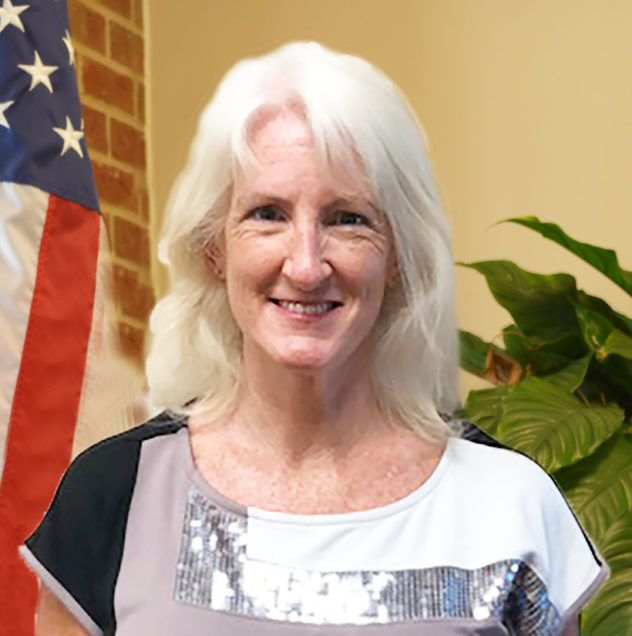If there was one single event that could best pinpoint the time when Monroe County’s financial fortunes took a sharp turn in the right direction, it came in August 2018 when the county hired Lorri Robinson as finance director.
Robinson was not just any ordinary hire. She came to Monroe County with three decades of local government finance experience and a history of successfully turning around finance departments plagued by mismanagement and understaffing.
Less than two years into her latest challenge, Robinson has already worked her financial wizardry in Monroe County, establishing policies that are expected to enable the county government to prosper for many years to come.
Robinson was raised in Abbeville, Ala., just west of the Georgia state line, but because her mother’s doctor’s practice was a few miles in Fort Gaines, Ga., she was actually born a Georgian. Robinson grew up on a farm in Abbeville, where her parents raised cows, pigs and peanuts. When her father, who also worked construction on power plants for a living, was transferred to a nuclear plant project in Missouri, Robinson’s family relocated to the Midwest as well. Robinson, who was in the ninth grade at the time of the first move, wound up attending five different high schools.
Despite the constant change, Robinson excelled as both a student and an athlete. Robinson loved swimming but she gave it up because she tired of getting up at 5 a.m. for early-morning swim practices. She instead turned her attention to running track after school before heading to her part-time job at a local Hardee’s. After finishing high school in Columbia, Mo., Robinson moved on to the less-famous MIT, Missouri Institute of Technology, in Kansas City, Mo. to begin her college career, specializing in information technology (IT).
As the oldest of three girls, Robinson said her middle-class parents couldn’t afford to pay for multiple children in college at the same time. So she got a student loan and paid off her car payments, turning her attention to her education. With her parents having already moved to the West Virginia mountains, Robinson eventually transferred to Allegheny Community College in nearby Pittsburgh, Pa. Robinson ultimately obtained computer science and accounting degrees from Allegheny during a time when computers were still in a primitive state.
“PCs (personal computers) were not even out then,” Robinson said. “Our lab was IBM machines. You walked into the lab and you had cabinets that were just a machine. They were taller than I was.”
Robinson recalls her college assignments were much different than those in the IT field today: “We were just starting out with computers. I can remember being in lab one day, and the professor was saying we had to write programs on different types of media. So as long as you’ve got a floppy (disk), that was fine. You could do code on it, and you wouldn’t have to worry about it. But one of our projects or assignments, we had to do one using the cards. So you had to punch on the 180 character cards. They had so many characters you could do on the card, so you knew you could only do a small amount of code on one card. So you had cards then stacked behind in sequential order. But then the professor said, ‘Do not drop these cards. Do not get these cards out of order. Because once they’re out of order then you’re going to have a hard time.’ But then if you want to run the program, you had to use the cards. We had a machine and we had to feed them in, and they had to be in sequential order for your program to run. And I think that was (IBM Report Program Generator) RPG that we were working our code in on that day. I said, ‘No one will ever even know what I’m talking about.’”
Just like in high school, Robinson wasn’t spending all of her time at school. In order to stay in shape, the high school runner worked part-time at an Elaine Powers fitness center. But more importantly, she also put her computer science and accounting schooling to good measure through her college’s work program. Beginning during her third year of college, Robinson commuted several days a week to downtown Pittsburgh, where she worked for a firm specializing in data entry. Even after her credit class was finished, the company asked her to stay on to write small programs like accounting packages or payroll.
Robinson remembers her daily commute to work in downtown Pittsburgh: “I would schedule my work so that I could leave my college and go straight there. Well I couldn’t afford the downtown parking, but you could park at Three Rivers Stadium and walk across the bridge. I did the monthly pass and it was a lot cheaper. However, you had to walk and you’re talking about during the school year when it’s freezing cold and the wind coming off that water, oh my goodness. But it was pretty. It was very pretty. So I walked downtown every day. There was a bagel shop, and I had not had bagels in Missouri or in the south. I didn’t even know what a bagel was. Well that was my lunch or dinner every time I worked because I could go get a brown bag. You got a bagel, you didn’t know what kind of bagel it was, whatever their prize for the day was. You got a piece of cheese and then you got a fruit, usually it was an apple, banana or an orange, and a soft drink for a dollar and a quarter. That was something I missed when I moved back south because they didn’t know what bagels were down here.”
Upon graduation from Allegheny Community College, Robinson said she couldn’t wait to get out of Pittsburgh and back in close proximity to her hometown of Abbeville, Ala. However, with information technology (IT) jobs not plentiful in that area, she instead called her aunt living in Riverdale, Ga. and asked if she could move in with her until she could find a job. Within three weeks, Robinson landed a job with an East Point-based (Certified Public Accountant) CPA firm, Post & Associates. Robinson managed the company’s first computer but quickly discovered it was easier than she thought it would be and she had a lot of free time. Therefore, one of the firm’s governmental accountants allowed Robinson to work as his assistant on the side, and she took over the financial books for the small town of Palmetto, where she lived. Palmetto eventually began doing some of its finances in-house, but Robinson set up the government’s initial computer. She then turned down a full-time job with Palmetto, but not long after that she decided to branch out on her own as the finance director for the City of Fayetteville.
Robinson said Fayetteville, which has over 15,000 residents now, was a town of only 2,500 at the time. She recounts the town had recently purchased a brand new IBM AS/400 computer system, and it wasn’t popular in the government office. Robinson said the computer’s hardware was daisy chained from one system to the next and required tracing back should the connection become lost.
She said, “All of their employees quit because they were scared to death of it. Sometimes equipment was sort of intimidating because it was so big.”
Robinson said when she arrived in Fayetteville, the financial books were six months behind, and the person who had tried to work with the new computer system had accidentally dumped all of the city’s financial files and could not recover them. Robinson said with the city’s annual audit fast approaching, she scrapped using the computer at all and with help from a re-assigned jail clerk used manual entry to get Fayetteville’s finances caught back up. Once the finances were up-to-date, Robinson started from scratch on the computer system for the following year.
“It was an experience, but it was a good experience because you knew the best of both worlds,” Robinson said. “You knew how to do the manual books versus the electronic method as well. After that, it was always computerized. And I stayed with Fayetteville for 25 years.”
Two days after turning 50 years old, Robinson decided to retire from Fayetteville, but there were unusual circumstances. As the United States remained in economic recession in the early 2010s, Fayetteville was one of many local governments to feel the effects. Initially, Robinson encouraged every city employee to forego eight work hours per pay period, and for the first six months every employee did so without complaint, enabling the city to avoid laying off anyone. In the meantime, she and other Fayetteville leaders searched for other options, one being retirement. With sweetened retirement packages offered, the city encouraged any employees who met the Rule of 75 (age plus years of benefits-eligible service) to take retirement. However, the money-saving plan wasn’t foolproof because 16 of the city’s 17 upper-level management employees, including Robinson, opted to retire at the same time, leaving a talent and knowledge void at the top of Fayetteville’s government.
With Fayetteville’s entire leadership team suddenly gone, Georgia Municipal Association (GMA) officials offered advice. They allowed Robinson to return to work for the city part-time until a replacement could be identified and trained. In the midst of her transition into “retirement”, Robinson’s father fell ill with a terminal lung cancer, passing away just a month after his diagnosis. While Robinson said she was glad her father didn’t suffer long from his illness, she regrets not getting to spend a planned weekend with him at the Panama City Beach, Fla. condo she had recently bought.
Another big change in her life upon retirement was a move to Jasper County, along Jackson Lake. Robinson, recently divorced at the time, had been living with her daughter Erica in Stockbridge, and when Erica later divorced as well, the two resided together once again in Robinson’s new lake-side home. That’s where Robinson helped raise two of her three grandchildren, Austin, 12, and Makala, 10. Robinson’s son Drew, who lives in Ohio, has one daughter, Jordan, 9.
Robinson said of the move to Middle Georgia: “I love water. On weekends, we were on the lake. We skied and did all those water sports and all that kind of stuff. Or we were at the beach. That’s why I bought a condo down in Florida.”
Despite continuing to work part-time for Fayetteville, she also took a part-time job in Henry County’s finance office. Once Robinson’s replacement in Fayetteville was sufficiently trained, she went to work for Henry County full-time for the next five years until Monroe County came calling.
Another point of transition in Robinson’s life was the start of a new relationship in 2010 with her now fiancé, Tony Byrd. Byrd, an Alabama native, spent a lot of time in Georgia while operating his family’s HVAC business, which held a number of Georgia government contracts. After his father’s retirement and an economic downturn, Byrd decided to re-locate to Henry County, where Byrd carries the HVAC license for the same government for which Robinson worked. He also continues to operate his own HVAC service company as well.
In addition to spending time at their Florida condo, Robinson said she and Byrd enjoy drag racing on Friday nights. She said Byrd is among the top class of pro stock drag racers at Atlanta Motor Speedway, and Robinson knows her way around cars too.
“I wouldn’t be in the top class, but I get out there and help him,” Robinson said. “They laugh at me because I hook the car back up on the trailer when we’re done. You just learn because you’re out there doing things. On pit row, I’m out there helping.”
While the commute to Henry County from Jackson Lake was about half the distance of her daily commute to Fayetteville, the one to Monroe County is even shorter. With Monroe County still reeling from the June 2018 firing of its previous finance director for failure to pay state and federal payroll taxes in a timely manner, Robinson said the position she stepped into in Monroe County was much like the one she encountered in her first days in Fayetteville.
Robinson said bank statements were months behind on being reconciled and the county’s general fund had been depleted. Meanwhile, lots of money was sitting unused in the bank in various Special Purpose Local Option Sales Tax (SPLOST) bond accounts.
“The county was not broke,” Robinson said. “It was not in the right funds. It was just mismanaged. . . It took me about until February or March 2019 that I was starting to get a handle on it.”
Robinson attributed much of the previous problems with a lack of utilization of the county’s Edmunds financial software. The finance office was also woefully understaffed with either one assistant or no assistants at all in the decade prior to Robinson’s arrival. One of the first things the county did after hiring Robinson was to ensure she had enough support. At the recommendation of an independent auditor, Gwen Griffin was hired as Robinson’s assistant to handle payroll. Also, longtime aid Suzanne Schultek was moved from an administrative assistant position to a finance assistant position to serve as an accountant and make sure the county’s bills are paid on time.
Robinson said one of her biggest achievements in Monroe County is ensuring the county maintains at least three months of cash reserves. By doing so, the county’s cash flow is at a manageable enough level that the county will not need to issue a tax anticipation note (TAN) to pay off its bills for the foreseeable future. Robinson’s also pleased that she’s streamlined the county’s finance processes to make them as easy as possible for department heads to create their own budgets and keep track of where they stand on expenses.
Even though Monroe County’s finances are back on solid ground, Robinson believes the best is yet to come for the county government.
“I look forward to growing with the county, to put tools in place to help guide and help to be financially stable so that we can improve Monroe County as a whole,” Robinson said. “We want to make it a great environment for businesses, for residents, for everybody. Some more policies and tools are going to be put in place. We’ve got things on this computer system that have not even been used that can be used. And we’ve bought it and paid for it and no one knows how to do it. We’ve got an employee portal on here that is my next step as soon as we complete this upcoming audit. And then the work order system. Everybody can use this work order system that is on here. I hate to say we’re moving Monroe County to the 21st Century. I hate to say that, but I kind of feel like that’s what we’re really doing. That’s why we don’t need to go backwards. We need to continue go forward, strive to move forward. The things we’ve put in place are good things.”




